
Academic advisers guide students in critical school decisions
With the 10,061 students who study at the University of South Dakota, the position of an academic adviser is meant to assist students throughout their time here, while also attempting to make sure no one gets lost in the system.
Steve Ward, director of the Academic Career and Planning Center (ACPC), said advisers are specially trained to guide students through the graduation process. The center utilizes a model in which professional advisers are available to lessen the loads students and staff carry.
Professional advisers are faculty who focus on first-years and sophomores within specific majors, Ward said. If an advisee has a question pertaining to another program or switches majors, the student is directed to a different member.
Having professional advisers allows faculty to put more of a focus on their classes and research and lightens the load of being in charge of a large group of advisees at the same, said Joy Korman, recruitment coordinator and adviser in the Delzell Education Center.
Since the enactment of the model in 2007, Ward said statistics show student satisfaction with the university has been on the rise, in addition to an increase in student retention rates.
All first-years and sophomores are first assigned to advisers in the ACPC, Ward said, unless they are within certain majors or in Honors.
If a student is in the Honors program, they are under an Honors adviser. Business majors and Physical, Elementary and Special Education majors are assigned to professional advisers within that department when they start school at USD. In a similar way, Dental Hygiene and Fine Arts students are advised by faculty in their major.
All other students upon reaching 45 credit hours are assigned by their major’s department to a faculty adviser.
A professional adviser herself, Korman advises more than 200 students. However, Korman is happy with advising and loves seeing the optimism and passion her students have for their futures.
“When I went to college our professors were the ones who were juggling teaching, they were juggling their research and then they were juggling their students,” Korman said. “I don’t think juggling all those things was easy. Having academic advisers… that’s really important. I’m glad that USD’s doing it, (and) I’m glad to be part of it.”
The ratio of students to each adviser varies, Ward said, but making sure no student is overlooked is one of the center’s main goals.
“We try and keep it low so we feel like we have time to see every student… and can actually spend some time with them,” Ward said. “We want to have half an hour to 45-minute appointments with our advisees so we get to know them well and make sure they feel like they’re well cared for.”
Sophomore Irene Aplan has had good experiences with USD’s advising model.
“I personally know that my advisers are really helpful in getting me information or getting me people I need to talk to,” Aplan said. “They’re more than willing to help me figure out what I need to know and who to go to and who to ask… It’s good as it is.”
On the other hand, senior Lacey Walters said she has had major issues with the advising process.
“I should’ve graduated in May, and I was advised to drop my minor,” Walters said. “My adviser didn’t know that you needed one to graduate, and she had been my adviser for four years. It was a disappointment. It just kind of seems like the advising isn’t as important to them as their teaching or their research, and I feel like that’s what many people have found.”
During the process, Ward said thinking ahead is what makes a meeting successful.
“What I think makes advising effective for students is when advisers talk to them about the longer term and the goals that students have, so that students can be thinking about those things themselves and develop a plan in their own mind,” Ward said.
(Photo: Steve Ward, director of the Academic Career and Planning Center, advises first-year Jack Fenner on classes for the spring semester Tuesday afternoon. All first-years and sophomores are assigned an adviser in the ACPC. Malachi Petersen / The Volante)

